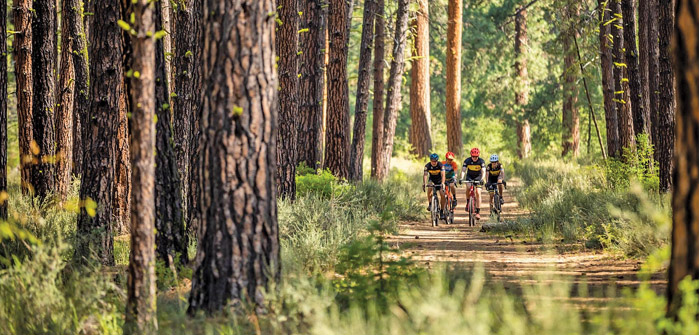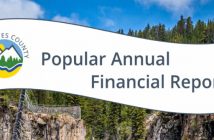(A group of cyclists buzzing the back roads near Camp Sherman | Photo by Trevor Lydon)
Dirty Freehub is a nonprofit created back in 2013 that tracks gravel roads, bike trails and quiet paved roads to create curated bike route guides. This year, the nonprofit celebrates their tenth anniversary.
Dirty Freehub was founded by Kevin English after he was injured on a mountain biking trip in Moab, Utah. While he was injured, his wife Linda English decided that he would make a great driver for her and her friends as they biked paved roads in rural Oregon.
“While supporting a road ride from Prineville to Post to Paulina, Kevin continued to notice the amazing gravel roads with no traffic that cut through the Ochoco National Forest,” Linda said. “So he purchased two gravel bikes, one for himself and one for me, and started riding. Finding routes was not so easy as there are very few signs that tell you where to go and some routes are much better than others.”
With the mission of organizing these bikeways to make future trips easier to plan and safer to accomplish for riders, the first Dirty Freehub website was born. Now, with over 15,000 followers on social media, Dirty Freehub tracks over 13,000 miles of curated route guides across the Western United States, Western Canada and Tasmania.
“So much of the Western United States has roads that were created for farming, logging or access to recreation, which are often great places for cyclists to ride,” Linda said. “Through our free guides, we inspire people to ride places that are scenic, fun to ride and have a lot less traffic. Our routes use gravel roads, quiet paved roads and bike trails that already exist.”
Dirty Freehub has many social missions. Aside from just being a very helpful planning tool for bikers looking to plan a ride, they also encourage people who use their website to connect with and appreciate rural parts of the West.
“We encourage people to ride to places that are often in rural or remote parts of the Western United States,” said Linda. Using Paisley, Oregon as an example, she continued and said, “Our hope is that cyclists enjoy these places, but also spend money by staying at hotels and eating at the local restaurants.”
This is inspired by Linda and Kevin’s greater mission; to help ease the divide between rural and urban communities. Linda mentioned how most of their followers are people from metropolitan areas like Portland, San Francisco, Seattle and a few other cities. A service like Dirty Freehub helps get people from these places out to more rural parts of America.
Education also plays a role in the mission of Dirty Freehub, “We educate cyclists on where they ride by including podcasts and stories about culture, history and the environment in the route guides,” Linda said. “For example, we want cyclists to learn about the Oregon Trail, to understand their impact on Sonoran pronghorn survival, or possibly to meet the artist who created the statue of a bear in Madras.”
In celebrating their tenth anniversary, Linda and Kevin see a bright future ahead for Dirty Freehub, listing out plenty of goals to help maintain and expand their service. These goals include; building and maintaining route guide across the Western United States while increasing their depth of educational materials for these regions; expanding the Dirty Roads Crew, which maintains popular routes by removing fallen trees and other debris; continuing to create “mashup routes” like the Read and Ride program where cyclists read a specific book that is tied to the region or route; and lastly, they are always striving to improve the Dirty Freehub website.




